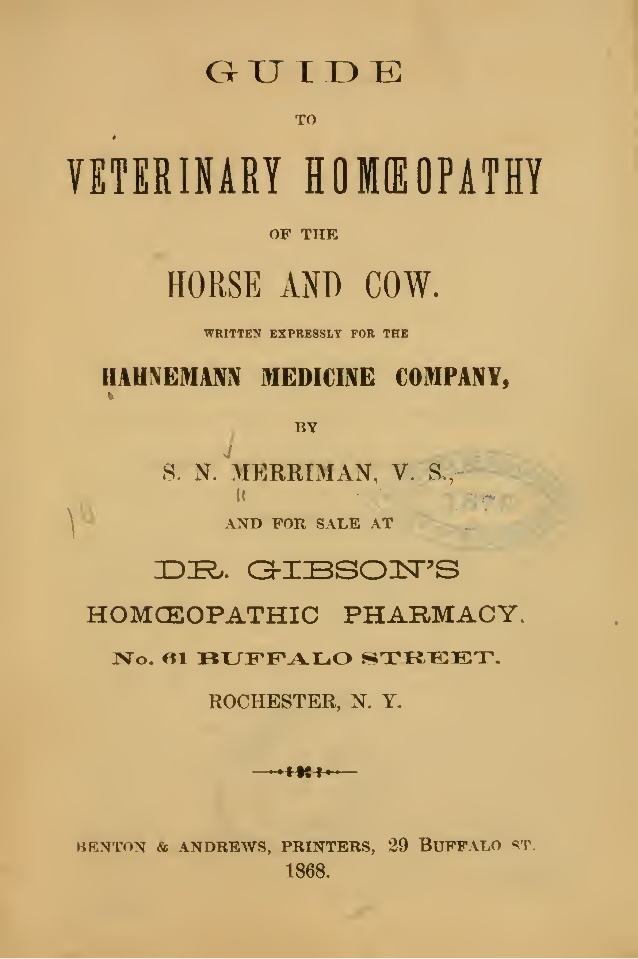Ever since Samuel Hahnemann, the German physician who invented homeopathy, gave a lecture on the subject in the mid-1810s, homeopathy has been used for treating animals. Initially, veterinary medical schools tended to reject homoeopathy as implausible, and the number of veterinary homeopaths remained small. In the 1920ies, however, veterinary homoeopathy was revived in Germany, and in 1936, members of the “Studiengemeinschaft für tierärztliche Homöopathie” (Study Group for Veterinary Homoeopathy) started to investigate homeopathy systematically.
Today, veterinary homeopathy is popular not least because of the general boom in so-called alternative medicine (SCAM). Prince Charles is just one of many prominent advocates who claims to treat animals with homeopathy. In many countries, veterinary homeopaths have their own professional organisations, while elsewhere veterinarians are banned from practicing homeopathy. In the UK, only veterinarians are currently allowed to use homeopathy on animals (but ironically, anyone regardless of background can use it on human patients).
Considering the implausibility of its assumptions, it seems unlikely that homeopathic remedies can be anything other than placebos. Yet homeopaths and their followers regularly produce clinical trials that seem to suggest efficacy. Today, there are about 500 controlled clinical trials of homeopathy (mostly on humans), and it is no surprise that, purely by chance, some of them show positive results. To avoid being misled by random findings, cherry-picking, or flawed science, we ought to critically evaluate the totality of the available evidence. In other words, we should rely not on single studies but on systematic reviews of all reliable trials.
A 2015 systematic review by ardent homeopaths tested the hypothesis that the outcome of veterinary homeopathic treatments is distinguishable from placebos. A total of 15 trials could be included, but only two comprised reliable evidence without overt vested interest. The authors concluded that there is “very limited evidence that clinical intervention in animals using homeopathic medicines is distinguishable from corresponding intervention using placebos.”
A more recent systematic review compared the efficacy of homeopathy to that of antibiotics in cattle, pigs and poultry. A total number of 52 trials were included of which 28 were in favour of homeopathy and 22 showed no effect. No study had been independently replicated. The authors concluded that “the use of homeopathy cannot claim to have sufficient prognostic validity where efficacy is concerned.”
Discussing this somewhat unclear and contradictory findings of trials of homeopathy for animals, Lee et al concluded that “…it is overwhelmingly likely that small effects observed in the RCTs and systematic reviews are the result of residual bias in the trials.” To this, I might add that ‘publication bias’, i. e. the phenomenon that negative trials often remain unpublished, might be the reason why systematic reviews of homeopathy are never entirely negative.
In recent years, several scientific bodies have assessed the evidence on homeopathy and published statements about it. Here are the key passages from some of these ‘official verdicts’:
“The principles of homeopathy contradict known chemical, physical and biological laws and persuasive scientific trials proving its effectiveness are not available”
Russian Academy of Sciences, Russia
“Homeopathy should not be used to treat health conditions that are chronic, serious, or could become serious. People who choose homeopathy may put their health at risk if they reject or delay treatments for which there is good evidence for safety and effectiveness.”
National Health and Medical Research Council, Australia
“These products are not supported by scientific evidence.”
Health Canada, Canada
“Homeopathic remedies don’t meet the criteria of evidence-based medicine.”
Hungarian Academy of Sciences, Hungary
“The incorporation of anthroposophical and homeopathic products in the Swedish directive on medicinal products would run counter to several of the fundamental principles regarding medicinal products and evidence-based medicine.”
Swedish Academy of Sciences, Sweden
“There is little evidence to support homeopathy as an effective treatment for any specific condition”
National Centre for Complementary and Integrative Health, USA
“There is no good-quality evidence that homeopathy is effective as a treatment for any health condition”
“Homeopathic remedies perform no better than placebos, and the principles on which homeopathy is based are “scientifically implausible””
House of Commons Science and Technology Committee, UK
“Homeopathy has not definitively proven its efficacy in any specific indication or clinical situation.”
Ministry of Health, Spain
“… homeopathy should be treated as one of the unscientific methods of the so called ‘alternative medicine’, which proposes worthless products without scientifically proven efficacy.”
National Medical Council, Poland
“… there is no valid empirical proof of the efficacy of homeopathy beyond the placebo effect.”
Federaal Kenniscentrum voor de Gezondheidszorg, Belgium
As they are usually far too dilute to contain anything, homeopathic remedies are generally harmless, provided they are produced according to good manufacturing practice (which is not always the case). Unfortunately, however, this harmlessness does not necessarily apply to homeopathy in general. When employed to replace an effective therapy, even the most innocent but ineffective treatment can become life-threatening. Since homeopaths recommend their remedies for even the most serious conditions, this is by no means a theoretical consideration. I have therefore often stated that HOMEOPATHICS MIGHT BE HARMLESS, BUT HOMEOPATHS CERTAINLY ARE NOT.
It follows that an independent risk/benefit analysis of homeopathy fails to arrive at a positive conclusion. In other words, homeopathy has not been shown to generate more good than harm. In turn, this means that homeopathy has no place in veterinary (or human) evidence-based medicine.



Too bad the rationalists have pretty much lost the debate and scam is becoming ever increasingly accepted into veterinary medicine. Respected colleges are teaching it, practitioners pay to learn it, and then go on to ply this bs on the public. Yes for now the argument accepts de facto scam is real. The sad part of this is that it will lead to loss of consumer confidence and erosion of the esteem with which the public holds the profession in…. The screamers and bullies hold the high ground at the moment and the spineless associations ,journals, and universities are content making money and keeping their heads in the sand.
that’s why we have to do something about it; without opposition, they will take over, that’s for sure.
So your wish is to have homeopathy abolished?
I did not say that.
what I did mean, I want people to be guided by the evidence not by people who make money out of misleading them.
The UK experience is different. Veterinary homeopathy is very fringe. There are probably less than 40 veterinary homeopaths in the UK out of 11,500 veterinary surgeons. Most are either nearing or past retirement age. I don’t think there’s been a new one in a number of years. The Royal College of Veterinary Surgeons has made its position on CAM very clear. Adjunctive only, not first line treatment. Anecdotally, referrals from other vets are drying up.
Veterinary homeopathy is dying in the UK.
Very pleased to hear that.
The end of veterinary homeopathy just means that the public will continue doing what they do now. Ie treat their animals with homeopathy, use other CAM treatments hydrotherapy and chiropractors. It will just all go underground.There are just too many of us who have seen that some so called evidence based treatments cause harm to animals whilst many CAM treatments with no evidence base work. The RCVS will continue to do nothing in fear of provoking a mass public backlash . That is why that statement just sits there being ignored. Rather humiliating for them and for people like UK homeopathy regulations .
“… too many of us who have seen that some so called evidence based treatments cause harm to animals whilst many CAM treatments with no evidence base work.”
please explain how you see that.
presumably you have anecdotes to support this statement.
do you know the difference between anecdote and evidence?
do you really think that CAM would not be generally adopted and promoted if there were evidence that it worked?
Hydrotherapy? In a physiotherapy setting it’s hardly CAM. It is worth pointing out that veterinary physiotherapists are asking for statutory recognition. The Veterinary Surgery (Exemptions) Order 2015 permits the treatment of animals with physiotherapy by a non-vet if a vet has prescribed it. It may or may not permit chiropractic and osteopathy – the Order mentions neither. The RCVS intreprets “physiotherapy” as meaning all manual therapies (so it could include massage therapy) but are clear that it excludes acupuncture and aromatherapy.
Hydrotherapy in its more bizarre forms practiced by naturopaths, yes, that is CAM but does anyone actually offer it for animals?
Animal owners (and their direct employees) can legally treat their animals with homeopathy – assuming i) that the homeopathic remedies used are legal in the UK (they have to registered with the Veterinary Medicines Directorate – some aren’t including nosodes) and ii) there’s nothing sufficiently wrong with an animal to warrant summoning a veterinary surgeon. The RCVS statement does not change this.
Dendra:
“many CAM treatments with no evidence base work”
Just ask yourself why this might appear falsely to be the case.
Let us know when you’ve come up with a good answer.
Like most other people I learn from my experience’s in life. People have a choice whether or not to continue to accept certain EB treatments when they don’t work. I then see hydrotherapy work which has no EB Base so I use it.
I think you got the wrong end of several sticks here;
for instance, who says that hydrotherapy as NO evidence-base?
https://www.internationaljournalofcardiology.com/article/S0167-5273(14)02069-5/fulltext
https://www.ncbi.nlm.nih.gov/pubmed/28520654
https://www.ncbi.nlm.nih.gov/pubmed/22806987
https://www.ncbi.nlm.nih.gov/pubmed/22806987
In animals as in humans hydrotherapy is a standard physiotherapy technique where the weight-bearing requirements of weak muscles and joints is removed, allowing specific exercises to be performed. It was an important part of the rehabilitation of our spaniel, Frodo, after surgery for a broken neck, as documented by the BBC in 2006:
https://www.rvc.ac.uk/Supervets/Episodes/Episode03/case01.cfm
https://www.rvc.ac.uk/Supervets/Episodes/Episode04/case02.cfm
Going back century or two, there was a different sort of hydrotherapy in use in the form of various water cures (famously used by Charles Darwin, to very little effect), and indeed it was very fashionable to take the waters in spa towns and to bathe in the sea for their supposed restorative effects. At the time it was probably safer than most of the other things that doctors did, though my eyes water when I read my great-great-great grandmother’s account of having cold water syringed under pressure into her womb.
https://drjengunter.wordpress.com/2018/04/15/naturopath-claims-to-treat-aggression-in-children-with-diluted-dog-rabies-saliva-no-really/